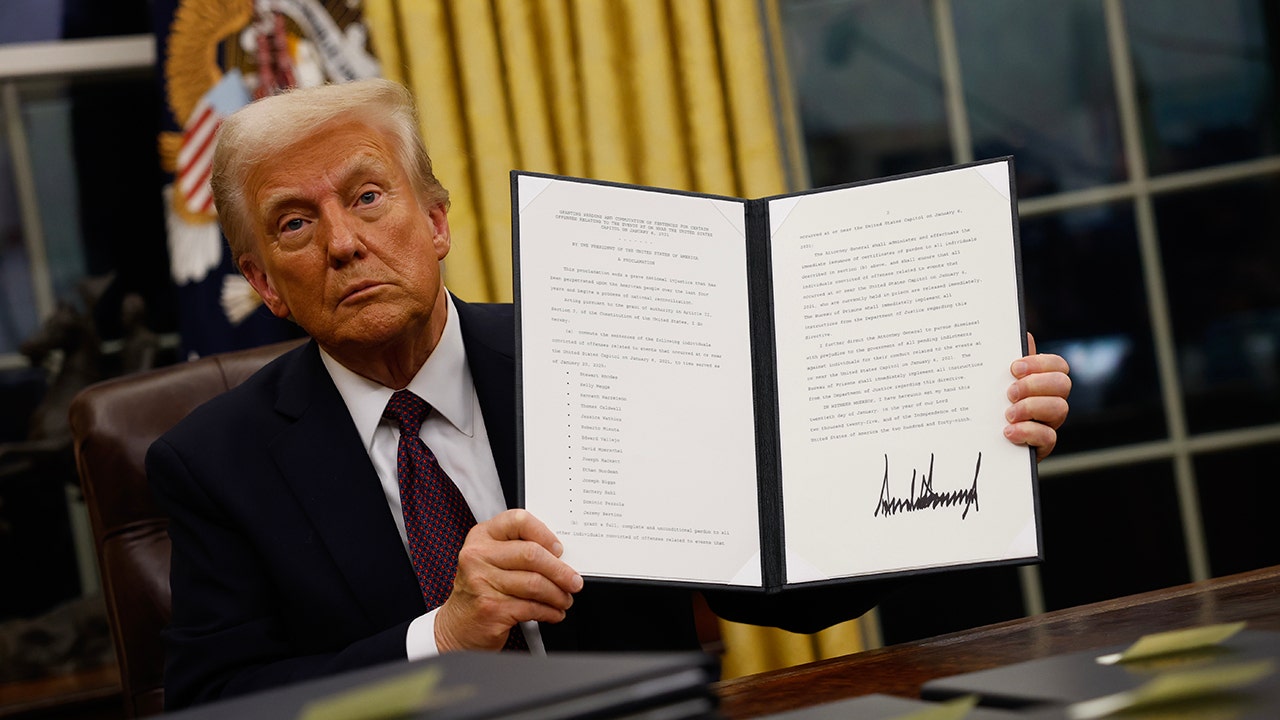Fox News Hosts Spar Over The Economic Effects Of Trump Tariffs

Table of Contents
Arguments in Favor of Trump Tariffs
Proponents of the Trump administration's tariffs argued that they were a necessary tool to protect American industries and jobs, stimulate domestic production, and strengthen the nation's negotiating power in global trade.
Protecting American Industries
- Increased domestic production: Tariffs made imported goods more expensive, making domestically produced goods more competitive. This led to increased production in certain sectors.
- Job creation in specific sectors: Industries like steel experienced a boost in production and employment due to reduced foreign competition.
- Reduced reliance on foreign goods: The tariffs encouraged businesses and consumers to shift towards domestically sourced goods, reducing reliance on foreign suppliers.
Proponents argued that tariffs shielded American businesses from what they perceived as unfair foreign competition, fostering growth and employment within the domestic market. They pointed to the steel industry, for instance, claiming tariffs helped revive production and create jobs. However, critics often countered that these gains were offset by losses in other sectors.
Reclaiming Lost Manufacturing Jobs
- Reviving the manufacturing sector: Tariffs were presented as a means to revitalize the American manufacturing base, which had experienced significant job losses over previous decades.
- Bringing jobs back to the US: The argument centered on the idea that tariffs would incentivize companies to shift production back to the United States, creating jobs in the process.
- Strengthening national security: Proponents linked the protection of certain industries, like steel, to national security, arguing that reliance on foreign suppliers posed a vulnerability.
The proponents of the tariffs often emphasized the need to reverse the decline of American manufacturing and bring jobs back to the US. They framed the tariffs as a necessary step to bolster national competitiveness and ensure economic self-sufficiency, particularly regarding strategically important industries. However, evidence supporting a significant net increase in manufacturing jobs due to tariffs remains contested.
Negotiating Leverage
- Stronger bargaining position with trading partners: Tariffs were seen as a tool to exert pressure on other countries, forcing them to the negotiating table.
- Forcing concessions: The threat of tariffs was used to extract concessions from trading partners, aiming to achieve more favorable trade agreements.
- Achieving better trade deals: Proponents argued that the tariffs ultimately led to fairer and more balanced trade deals, beneficial to the US economy.
A key argument for the tariffs was that they gave the US a stronger hand in international trade negotiations. The administration used the threat of tariffs to secure changes in trade practices from countries like China, suggesting that this aggressive approach achieved better trade deals than traditional diplomacy alone. This strategy, however, also resulted in retaliatory tariffs and trade disputes.
Arguments Against Trump Tariffs
Opponents of the Trump tariffs argued that they harmed the US economy in multiple ways, impacting consumers, businesses, and the global trading system.
Increased Prices for Consumers
- Higher costs of goods: Tariffs directly increased the prices of imported goods, resulting in higher costs for consumers.
- Reduced purchasing power: The increased cost of goods reduced consumers' purchasing power, impacting their ability to afford essential items.
- Inflation: The widespread price increases due to tariffs contributed to overall inflation in the US economy.
Opponents highlighted that tariffs increased the cost of goods for American consumers, leading to a decrease in purchasing power. They cited examples of increased prices for everyday goods like clothing, appliances, and even food, arguing that the burden of tariffs disproportionately affected lower-income households.
Damage to American Businesses
- Reduced exports: Retaliatory tariffs imposed by other countries hurt American businesses that exported goods.
- Supply chain disruptions: Tariffs caused disruptions in global supply chains, increasing costs and uncertainties for businesses.
- Increased production costs: Businesses that relied on imported inputs saw their production costs rise sharply, reducing their competitiveness.
The impact of tariffs extended beyond consumers to negatively affect many American businesses. Opponents highlighted instances where retaliatory tariffs reduced the demand for American exports, and supply chain disruptions added significant costs for businesses, leading to job losses and economic hardship in sectors relying on imports.
Retaliatory Tariffs and Trade Wars
- Escalation of trade disputes: Tariffs triggered retaliatory actions from other countries, leading to escalating trade disputes.
- Damage to international relations: The trade wars damaged international relations, undermining cooperation and trust among nations.
- Negative impact on global trade: The trade wars had a significant negative impact on global trade flows and economic growth.
The opponents argued that the Trump administration's tariffs initiated trade wars that negatively impacted both the US and the global economy. They highlighted how retaliatory tariffs from other countries reduced American exports and disrupted international trade relationships. The resulting economic uncertainty hurt both domestic and international businesses.
The Fox News Debate: Key Takeaways and Contrasting Views
The Fox News debate showcased a stark contrast in economic perspectives. One host emphasized the supposed successes of the tariffs in protecting American industries and creating jobs, citing anecdotal evidence and focusing on specific sectors. The other host countered with data highlighting the increased cost of goods for consumers, the damage to export-oriented businesses, and the broader negative impacts on the global economy. The debate highlighted the limitations of simplistic narratives surrounding the complex effects of trade policies, and the difficulty in attributing specific economic outcomes directly to tariffs. The overall tone was highly charged, reflecting the deeply partisan nature of the issue.
Conclusion
The debate surrounding the economic effects of Trump tariffs remains highly complex. While proponents argued for their role in protecting American industries and strengthening negotiating leverage, opponents pointed to the increased costs for consumers, damage to American businesses, and the escalation of trade disputes. The Fox News debate illustrated this fundamental disagreement and the absence of a clear consensus on the overall economic impact. Further analysis and data are needed to fully understand the long-term consequences of these policies. Continue to research the economic effects of Trump tariffs and form your own informed opinion on this complex issue.

Featured Posts
-
 Bitcoin Madenciliginin Gelecegi Son Mu
May 09, 2025
Bitcoin Madenciliginin Gelecegi Son Mu
May 09, 2025 -
 Major Nhl Storylines 2024 25 Seasons Second Half
May 09, 2025
Major Nhl Storylines 2024 25 Seasons Second Half
May 09, 2025 -
 Stricter Uk Visa Requirements Aimed At Curbing Immigration Abuse
May 09, 2025
Stricter Uk Visa Requirements Aimed At Curbing Immigration Abuse
May 09, 2025 -
 Surviving The Trade War A Cryptocurrencys Path To Success
May 09, 2025
Surviving The Trade War A Cryptocurrencys Path To Success
May 09, 2025 -
 Planlegg Vinterferien Trygt Veiforhold I Sor Norge
May 09, 2025
Planlegg Vinterferien Trygt Veiforhold I Sor Norge
May 09, 2025
Latest Posts
-
 News From The Bangkok Post The Push For Better Transgender Rights
May 10, 2025
News From The Bangkok Post The Push For Better Transgender Rights
May 10, 2025 -
 The Bangkok Post And The Ongoing Struggle For Transgender Equality
May 10, 2025
The Bangkok Post And The Ongoing Struggle For Transgender Equality
May 10, 2025 -
 The Impact Of Trumps Executive Orders On The Transgender Community A Call For Stories
May 10, 2025
The Impact Of Trumps Executive Orders On The Transgender Community A Call For Stories
May 10, 2025 -
 Examining Transgender Equality Issues Highlighted By The Bangkok Post
May 10, 2025
Examining Transgender Equality Issues Highlighted By The Bangkok Post
May 10, 2025 -
 The Bangkok Post And The Fight For Transgender Equality In Thailand
May 10, 2025
The Bangkok Post And The Fight For Transgender Equality In Thailand
May 10, 2025
